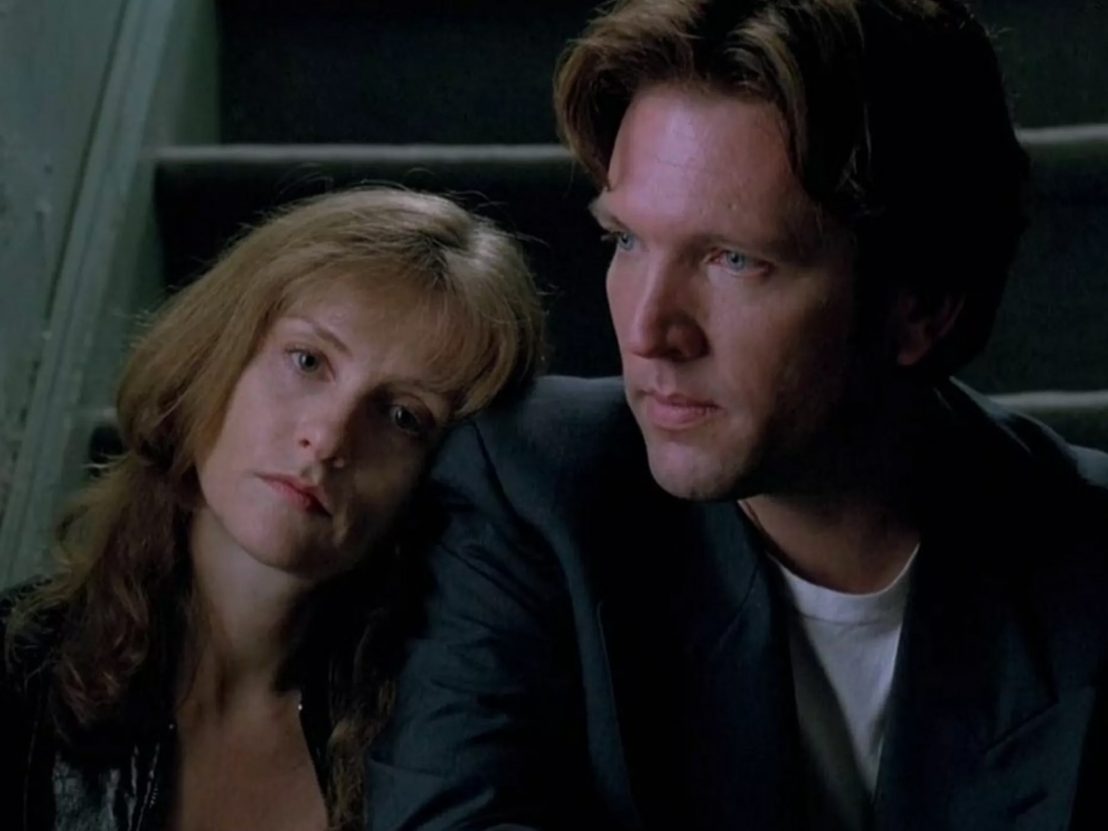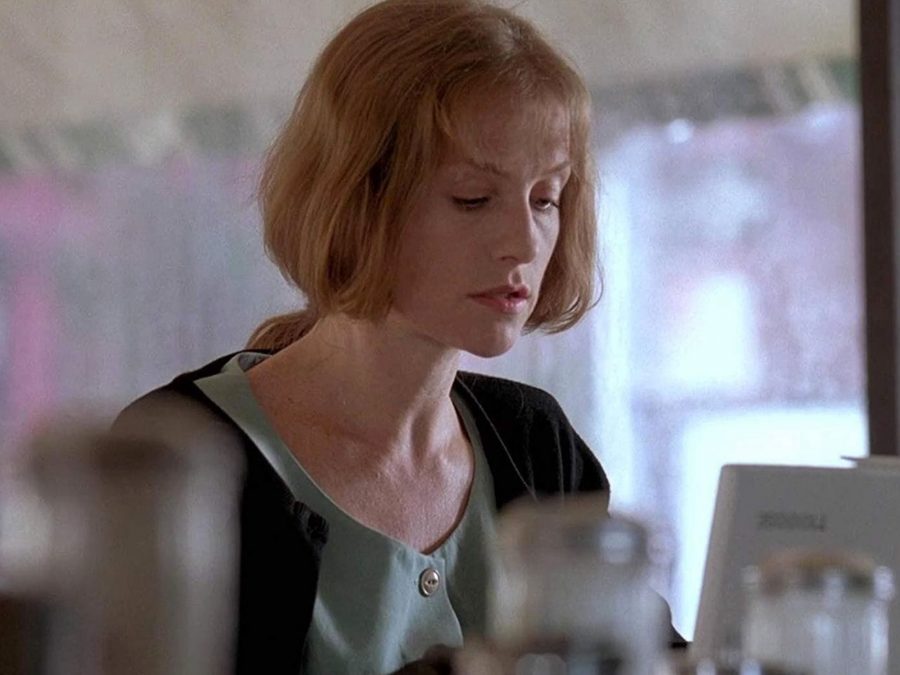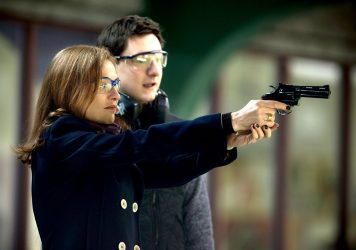
Mrs. Harris Goes to Paris promises a delightfully flamboyant performance from Isabelle Huppert as its villain in the latest of the esteemed French actor’s rare Anglophone roles. Although the best-known of these few films is probably the infamous financial flop Heaven’s Gate (1980) or Neil Jordan’s kitsch B-movie Greta (2018), the finest is surely Amateur.
Feature number five by nouvelle vague-inspired American auteur Hal Hartley, Amateur is an unusual film about philosophy, amnesia, pornography, floppy discs and the unlikely alliances that shared adversity forces us to make.
Thomas (Martin Donovan), wakes up on a New York side street, unaware of who he is and what is going on. He bumps into Isabelle (Huppert), an erotica writer in search of a publishing deal, who spends hours every day typing up her work in a coffee shop, much to the ire of the barista who complains that she buys only a single muffin or coffee each visit. We also meet Sofia (Elina Löwensohn), who asserts that Thomas trafficked her into porn when she was a teenager, and now seeks revenge on Jacques, Thomas’s crime boss, by obtaining and leaking data on floppy disks that will lead to his exposure.
Even in today’s supposedly more enlightened times, being a prominent woman in the film industry means that your sex appeal is always brought up in the press. Huppert and Hartley are aware of this, and they developed a character who is vulgar and sex-obsessed, yet clumsy and naïve. While Thomas is bathing, and Isabelle is sitting in the bathroom talking to him, their conversation tends towards his current naked state. Hartley is satirising how most films seem to be unable to depict nudity without referring to sex, by bringing the conversation towards the topic through awkward, unsexy dialogue. In a hilarious exchange, we learn that Isabelle, who is trying to find work in writing erotica, bears an unusual distinction: ‘How can you be a nymphomaniac and never have had sex?’ ‘I’m choosy’.
Later on, Isabelle dons an Irma Vep-style catsuit and attempts to perform a suggestive pose, with her head leaning back and her weapon of choice (a drill) pointing upwards à la 007. It’s hilariously gauche and frustrates any mainstream viewer who wants to be titillated. Conversation in the film often draws on sex, but the only sex we see is brief glimpses of VHS porn, involving Sofia, played on TV.
The violence in the film initially seems like this as well – the film’s opening scene, with Matthew lying on the pavement after having been pushed out of a window, does not depict the actual act of violence. We do not see his acts of violence against Sofia either, but it is heavily implied that Thomas is culpable. The film challenges you to identify with and root simultaneously for an apparent abuser, his alleged victim and a third party who appears completely out of place. As everyone gets increasingly embroiled in the criminal underworld, the film becomes very violent – though some of the violence is played for laughs. It’s completely unpredictable.
Thomas is ‘reset’ – within the confines of the film’s narrative timeframe, we see him treat people with kindness, and at worst, ambivalence. Isabelle is also ‘reset’, seeking a career after years in the convent, and Sofia just wants to get her revenge over and done with. Three people with separate pasts, but only two can remember them. Crucially, the one who has wronged somebody cannot remember doing so.
The film’s French New Wave DNA is very apparent. The graphics at the beginning are as striking as, say, those of Godard’s La Chinoise or Weekend, the nonchalant line delivery is very Bressonian, and the core mystery’s slow unravelling would make Rivette proud. The aforementioned graphics show a black screen with coloured lines moving across in random directions, reflecting the unpredictable journeys that the film’s characters find themselves thrust into, and the film’s commentary on pornography is on the right side of history.

Huppert wrote a letter to Hartley begging him to cast her in one of his films – surely an honour for a director that no formal award or accolade can beat. Huppert has worked with many fine filmmakers, such as Preminger, Téchiné, Losey, Hansen-Løve, Verhoeven, and collaborated multiple times with Chabrol, Haneke and Godard, but here, more than ever, we can see that she is at the forefront of developing her character.
The genius of the story is that so much is off-screen and left to interpretation. Though Thomas is framed more centrally than Sofia, it is strongly implied that he is her abuser, and thus the villain of the story. Following several mishaps with criminal associates, she has to abandon her plan and take his side to evade a mutual enemy. The film refers to the abuse inherent to pornography, and a scene with a video store clerk comments on the way in which it makes men see women merely as objects for their own titillation. How many other films actually call out the porn industry for the abusive, exploitative, misogynistic force it actually is?
Characters seem to be aware that any film that uses technology as a plot device will become dated quickly. Their references to the limitations of mid-90s mobile phones, and the queerness of the floppy disk suggest that wireless technology is in an awkward transitional stage whereby it’s increasingly useful but not yet reliable per se. The soundtrack is also very rooted in its time – it features PJ Harvey (who would later star as Mary Magdalene in Hartley’s The Book of Life), Liz Phair and My Bloody Valentine – three powerhouses of angsty, aggressive 90s alternative.
Though Huppert is one of the most versatile actors in the world, her best-known role type is that of cunning, cold, and sometimes cruel characters. The gormless, confused yet well-intentioned Isabelle of Amateur is a complete rejection of this. Her characters often know more than they reveal, but here, she is lost and trying to help an amnesiac piece together his past. Ten years later, Huppert would play another ‘quirky’ role in David O. Russell’s insufferable I Heart Huckabees, but the key to Amateur is the self-awareness, script and deft coördination of contrapuntal moments of loudness and subtlety. It is funny, fascinating, moving, and has a perfect ending which serves the story perfectly.
One can lavish praise on the machinations of this wonderfully layered, dense and thrilling film, but at the end of the day I’m here to celebrate Huppert most of all. Amateur is a perfect showcase for not only her sheer acting prowess, but also her willingness to lead films that are subversive and intellectual. The Gallic great has gall, and is more than just a professional. She’s an artist who always elevates whatever film she is in.
Ciné Lumière in South Kensington is running an Isabelle Huppert retrospective season until November 1.
Published 24 Oct 2022

The screen icon discusses her craft plus her upcoming roles in Mia Hansen-Løve’s Things to Come and Michael Haneke’s Happy End.

Isabelle Huppert and Paul Verhoeven reunite to potent effect in this sly, caustic social critique.